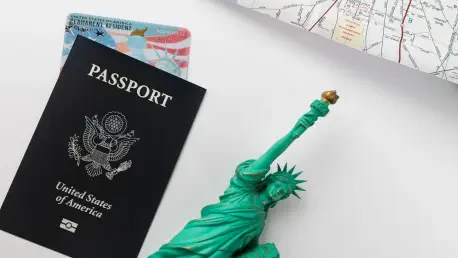The tension over immigration enforcement activities in Los Angeles County has reached a critical threshold, with local leaders and residents expressing growing concern over federal tactics. The escalation comes in response to the Trump administration’s controversial measures, which many accuse of being overbearing and in violation of constitutional rights. Amidst the controversy, reports of unconstitutional stops and arrests by individuals claiming to be federal agents have sparked outrage and prompted potential legal action. This fraught atmosphere highlights a broader struggle between federal enforcement ambitions and local governmental priorities aiming to protect diverse communities and uphold civil rights.
Council members, city officials, and advocacy groups have been vocal about perceived violations of the 4th Amendment, which protects against unreasonable searches and detentions. Fueling this contention is the alleged racial profiling involved in these illegal stops. As a result, a proposal by seven Los Angeles City Council members, including City Attorney Hydee Feldstein Soto, calls for immediate legal action to protect community members. This push for judicial intervention reveals the complexities local governments face as they grapple with potential federal overreach, relying on constitutional protections to assert their jurisdiction over local matters.
Constitutional Rights Under Threat
In Los Angeles, local leaders seek to navigate the complexities presented by aggressive federal immigration enforcement practices, emphasizing the need for constitutional adherence and civil rights protection. Council member Katy Yaroslavsky has voiced concerns about residents living in perpetual fear, exacerbated by the looming threat of detainment and deportation. She underscores the importance of local governmental action in safeguarding vulnerable communities, stressing that the timing is pivotal to mitigate the impact of these federal operations. The reports of individuals without official identification or badges profiling residents have intensified calls for clarity and restraint in enforcement activities.
The ramifications of these enforcement activities have reverberated across the Southland, visibly affecting community operations. In Pasadena, fears stemming from social media reports of federal enforcement presence led to the cancellation of summer park programs, a preemptive move reflecting the apprehension felt throughout the region. This episode highlights how enforcement tactics, alleged or real, disrupt daily life and foster an environment of anxiety, further complicating the immigrant community’s lived experiences. The decision to cancel activities illustrates the broader implications of creating perceived safe spaces that inadvertently become zones of fear.
Resistance and Community Response
The heightened tension reached a notable point in Pasadena with raids resulting in detentions that drew significant media attention. The community and activists responded swiftly, organizing an emergency vigil to vocally oppose these actions. They argue that such raids fracture families and plunge communities into chaos, a sentiment shared by many who view their neighbors as contributing members rather than lawbreakers. Pablo Alvarado, from the National Day Laborer Organizing Network, eloquently criticizes the criminalization of individuals who have played vital roles in community building, underscoring their defense against indiscriminate enforcement.
Additional protests have emerged in localities such as Maywood and Bell, with demonstrations opposing the Trump administration’s policies gaining momentum. As protests occasionally turn violent, the U.S. Department of Homeland Security has highlighted heightened risks for Border Patrol agents, a claim supported by White House spokeswoman Abigail Jackson. These developments underscore the complex dynamics at play between regional opposition and federal strategies, demanding careful navigation from all involved parties. As these narratives unfold, local leaders continue to advocate for maintaining peace and upholding lawful opposition, distancing themselves from any incitement of violence.
The Call for Accountability and Transparency
The call for transparency in federal operations echoes across the region, with Huntington Park Mayor Arturo Flores leading a charge against questionable “immigration-related activity.” His condemnation stems from reports of residents being forcefully taken by individuals in unmarked vehicles without visible credentials. Flores’ demand for the cessation of these raids is matched by a broader consensus among officials and community groups, highlighting a need for transparency and statutory compliance. Huntington Park’s commitment to scrutinizing enforcement practices reflects a unified stance among Southland communities who feel overlooked by federal decisions.
Mayor Flores’ insistence on proper law enforcement protocols aligns with a wider demand for accountability in federal practices. Local governance is increasingly stepping in to shield community members from what is perceived as federal overreach. The collective voice of Southland leaders underscores their dedication to enhancing scrutiny and ensuring accountability in enforcement activities. In this evolving dialogue, the call for adherence to transparent practices resonates with a broader push for policies that harmonize with civil liberties, signaling a potential shift in how immigration enforcement might unfold in the future.
Navigating Complexities of Immigration Reform
Tensions over immigration enforcement in Los Angeles County are rising as local leaders and community members voice concerns about federal methods. The Trump administration’s controversial tactics have led to accusations of overreach and constitutional violations. Reports of unconstitutional stops and arrests by those claiming to be federal agents have stirred public outrage and might lead to legal action. This situation underscores a broader battle between federal enforcement objectives and local government’s commitment to safeguard diverse communities and uphold civil liberties.
City officials, council members, and advocacy groups have criticized what they perceive as 4th Amendment violations, which guard against unreasonable searches and arrests. Allegations of racial profiling add fuel to the fire, intensifying the debate over these practices. In response, seven Los Angeles City Council members, including City Attorney Hydee Feldstein Soto, have proposed legal measures to safeguard residents. This push for legal recourse highlights the complexities facing local governments as they confront potential federal overreach, using constitutional rights to affirm their control over regional issues.









